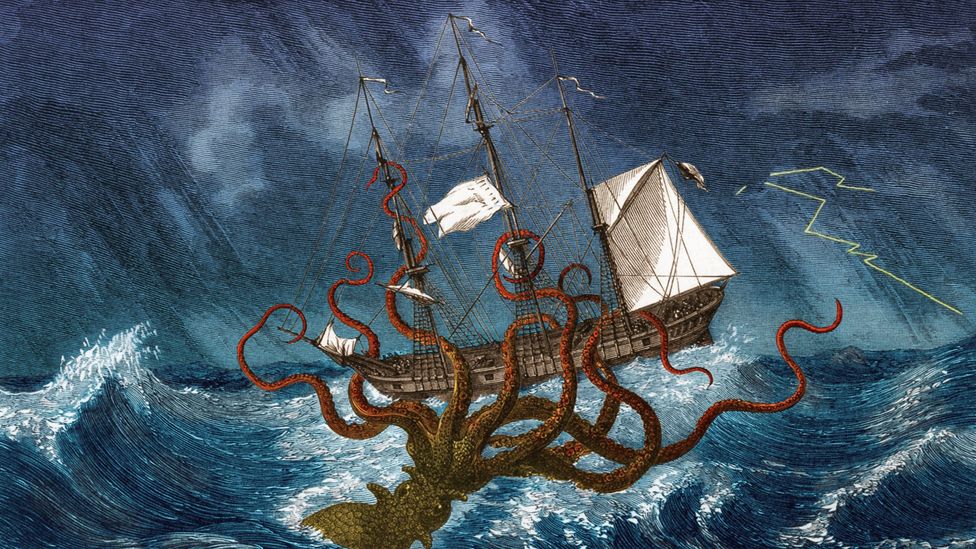Krakens and leviathans are mythical giants found in sea myths across cultures. Krakens are legendary sea creatures with multiple arms or tentacles, originated from Scandinavian folklore, and feared for their immense size and strength. Leviathans, on the other hand, are large sea monsters mentioned in the Hebrew Bible, Talmud, and other Jewish texts, depicting massive sea serpents, dragons, or whales that are associated with chaos and disruption. Despite their differences, krakens and leviathans are both mythical sea creatures that inhabit the depths of the ocean, strike terror into sailors and fishermen, and are connected to the supernatural and divine.
Krakens vs. Leviathans: The Mythical Giants of Sea Myths Across Cultures
Introduction
Throughout history, human beings have always been fascinated by the vast and mysterious depths of the ocean. It is not surprising that countless myths and legends have emerged surrounding the creatures and beings that inhabit these depths. Among these, the kraken and leviathan are two of the most famous mythical giants found in sea myths across cultures. In this article, we will explore the differences and similarities between krakens and leviathans and their significance in various mythologies.
Krakens
Krakens are legendary monstrous sea creatures that are described as having multiple arms or tentacles and are often depicted as being large enough to be able to sink entire ships. They are believed to have originated from Scandinavian folklore, with the oldest known description dating back to the 13th century.
In Norse mythology, the kraken is said to dwell off the coast of Norway and Greenland and is often depicted as a giant octopus or squid that could drag ships and fishermen to their doom. The kraken was feared for its immense size and strength, and it was believed that its attacks were a sign of impending disaster.
In European folklore, krakens are said to dwell off the coasts of Norway and Iceland, and their appearance varies. They can be depicted as giant octopuses or squid-like creatures, with massive tentacles capable of dragging ships down to the ocean’s depths.
Leviathans
Leviathans are large sea monsters mentioned in the Hebrew Bible, Talmud, and other Jewish texts. They are often depicted as massive sea serpents, dragons, or whales that are capable of breathing fire, lightning, or poison. In the Christian tradition, leviathan is identified as a demon that can only be defeated through the power of God.
In ancient mythology, leviathans are often associated with chaos and disruption. In the Babylonian Epic of Gilgamesh, a leviathan-like creature dwells in the primordial ocean, and its destruction is seen as necessary for the creation of the world.
In Islamic mythology, leviathan is known as “Bahamut,” and is said to support the earth on its back, and below it is an angel holding a bull-shaped rock, which in turn supports seven different continents.
Differences Between Krakens and Leviathans
Krakens and leviathans differ in several ways. Krakens are typically portrayed as monstrous octopuses or squid-like creatures that can have multiple arms and massive tentacles. Leviathans, on the other hand, are depicted as massive sea serpents or whales capable of breathing fire, lightning, or poison.
Krakens are associated with Norse and European folklore, while leviathans are mentioned in the Hebrew Bible, Talmud, and other Jewish texts. In popular culture, krakens are often portrayed as being more brutish and destructive, while leviathans are more commonly associated with the creation myth and seen as enigmatic and mysterious.
Similarities Between Krakens and Leviathans
Despite their differences, krakens and leviathans share some common traits. Both are mythical sea creatures that are associated with chaos and destruction. They are also thought to be giant creatures that inhabit the depths of the ocean, and their mere presence can strike terror into the hearts of sailors and fishermen.
Krakens and leviathans also share a connection to the supernatural and the divine. Krakens are often associated with Norse gods such as Odin and Thor, while leviathan is identified as a demon in Christian tradition.
Conclusion
The mythological giants of the sea, krakens, and leviathans have captivated the imaginations of people worldwide for centuries. While they differ in their origins, appearances, and associations, they remain powerful symbols of the vast and mysterious depths of the ocean, drawing attention to the awe and wonder that it inspires in human beings.
